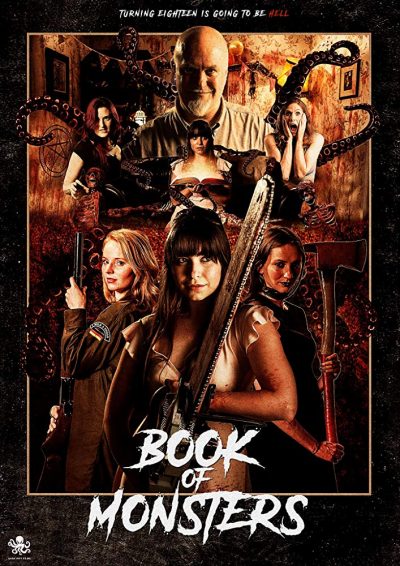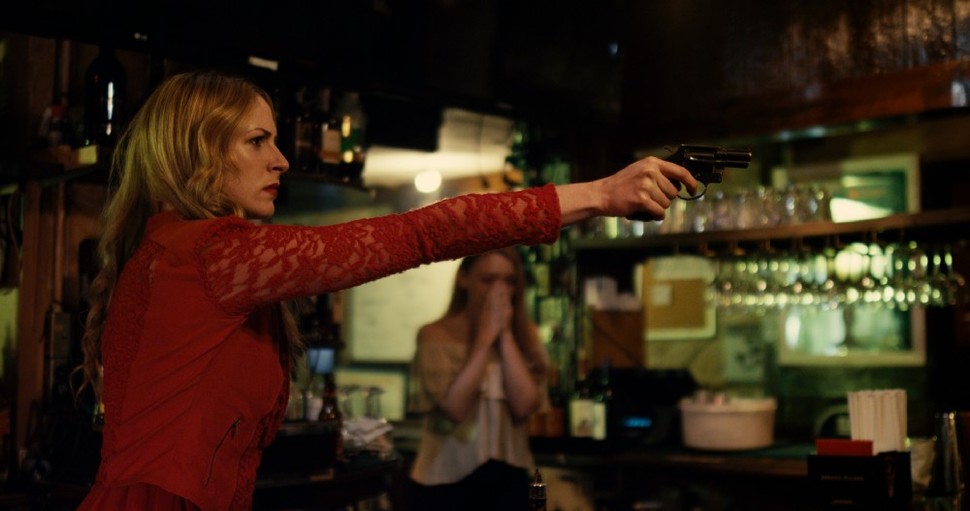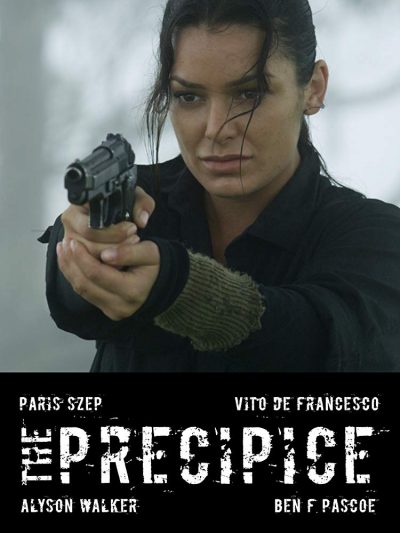★★★
“A thoroughly Canadian apocalypse”
 Really, for a reported budget of about $6,500 – and those are Canadian dollars, which currently works out to less than five grand in freedom dollars – this is quite impressive. You could argue that trying to create a convincing post-apocalyptic scenario on such a tiny budget is biting off more than you can chew. And there are certainly moments which just don’t work. But in its low-key approach, it’s probably a more accurate reflection than many of the way in which the world might end. Not with a bang, but with a whimper, and a slow grinding to a halt.
Really, for a reported budget of about $6,500 – and those are Canadian dollars, which currently works out to less than five grand in freedom dollars – this is quite impressive. You could argue that trying to create a convincing post-apocalyptic scenario on such a tiny budget is biting off more than you can chew. And there are certainly moments which just don’t work. But in its low-key approach, it’s probably a more accurate reflection than many of the way in which the world might end. Not with a bang, but with a whimper, and a slow grinding to a halt.
In this case, it’s an electromagnetic pulse weapon, detonated high in the atmosphere (most likely by North Korea, going off early radio broadcasts) and wiping out everything that use electronics. Which, these days, is virtually everything. When it does, young heroine Niamh (Ferreri, the director’s daughter) is staying with her grandmother, because Dad is away on a business trip. Initially, they hole up, trying to wait it out, but eventually resources dwindle and Niamh has to strike out on her own. Fortunately, Dad was a bit of a prepper and so she is better prepared than most girls her age for life in the new, primitive world, as well as encountering other survivors, both good and bad.
Undeniably, you have to allow a lot of leeway for the very limited resources. Even given the rural setting, it’s never clear to where 99% of the population has gone, or why; a throwaway line saying, “A bunch of people left a few nights ago,” is about as close as we get. The collapse of civilization into anarchy and chaos is depicted by a shot of Niamh and her grandmother, peering out the window and looking concerned, while somewhat riotous sound-effects are heard. All told, as the tagline above implies, it’s a very polite end of the world. It’s also a bit unusual, and therefore refreshing, to see a positive portrayal of survivalists. Rather than the usual wild-eyed paranoiacs, they’re depicted here as down-to-earth, and simply prepared for unfortunate events.
The technical aspects are quite impressive, especially on the visual front where it certainly doesn’t look like a microbudget production. However, the film does drag in the middle. From the point at which Niamh meets another young survivor, Will (Davidson), it seems to spin its wheels for the longest time, despite the pair stumbling across a rare car still capable of driving. It takes the injection of an external threat before the plot begins to move forward again, and Ferreri deserves credit for getting its depiction of killing right, as not something which should be done lightly by anyone.
The movie did tie up its loose ends up a little too conveniently, just when it was looking set fair to be nicely ambiguous. Though on the other hand, this offers a somewhat hopeful note on which to finish things. That might not be a bad thing after a generally downbeat experience, and if it remains the complete cinematic opposite of, say, Fury Road, that’s not entirely a bad thing.
Dir: Adriano Ferreri
Star: Rosa Ferreri, Liam Davidson, Derek A. Bell, Martin Saunders






 The above is the Polish for “seven”, and in the first half-hour, you’ll be forgiven for thinking that’s what you’re watching: a Polish knock-off of David Fincher’s Se7en. Homicide cop Helena Rus (Kożuchowska) is struggling to come to terms with life, after her boyfriend is killed by a drunk-driver and, for political reasons, the criminal is allowed to go free. A welcome distraction comes in the shape of a series of ritualistic murders: every day at 6 pm, a body turns up on the streets of Wroclaw. The victims have been killed in strange and unusual ways – the first, for example, is sewn inside a cow-hide, which shrinks as it dries, crushing the victim to death. Each has a word branded into their flesh, such as “Degenerate”.
The above is the Polish for “seven”, and in the first half-hour, you’ll be forgiven for thinking that’s what you’re watching: a Polish knock-off of David Fincher’s Se7en. Homicide cop Helena Rus (Kożuchowska) is struggling to come to terms with life, after her boyfriend is killed by a drunk-driver and, for political reasons, the criminal is allowed to go free. A welcome distraction comes in the shape of a series of ritualistic murders: every day at 6 pm, a body turns up on the streets of Wroclaw. The victims have been killed in strange and unusual ways – the first, for example, is sewn inside a cow-hide, which shrinks as it dries, crushing the victim to death. Each has a word branded into their flesh, such as “Degenerate”. Within about two minutes of starting this, I realized I had made a terrible mistake, and was watching something barely reaching the amateur level of film production. Still, I soldiered on – albeit for some loose definition of “soldiered” – until the bitter end, mostly so I could issue an informed warning about this to any prospective viewers. Maxine (Mitchell) is rather upset when she discovers her boyfriend, music video producer Lance (Watts) has been cheating on her with Lana (Bryant). Mind you, she’s clearly a bit unhinged already: for example, telling him she’s pregnant when she isn’t. So it’s not much of a surprise when her reaction to his two-timing is to kidnap Lance, tie him up in her basement and submit him to various indignities, along with seeking revenge on Lana. Which, apparently, includes sleeping with her father (Walker).
Within about two minutes of starting this, I realized I had made a terrible mistake, and was watching something barely reaching the amateur level of film production. Still, I soldiered on – albeit for some loose definition of “soldiered” – until the bitter end, mostly so I could issue an informed warning about this to any prospective viewers. Maxine (Mitchell) is rather upset when she discovers her boyfriend, music video producer Lance (Watts) has been cheating on her with Lana (Bryant). Mind you, she’s clearly a bit unhinged already: for example, telling him she’s pregnant when she isn’t. So it’s not much of a surprise when her reaction to his two-timing is to kidnap Lance, tie him up in her basement and submit him to various indignities, along with seeking revenge on Lana. Which, apparently, includes sleeping with her father (Walker). Ten years ago, the mother of eight-year-old Sophie (Craine) was attacked and killed by what her daughter insisted was a monster – a claim to which she held, resulting in her being institutionalized. Now, a somewhat recovered Sophie is about to enjoy her 18th birthday, having organized a party with her friends. But she’s about to discover that the monsters were very real, and just waiting for her to reach adulthood. Fortunately, Mom was a bit of a monster hunter, who conveniently left a book of helpful tips as well as a secret vault of tools and weapons. Together with her pals, Sophie is prepared to make a stand and defend her home against the attackers.
Ten years ago, the mother of eight-year-old Sophie (Craine) was attacked and killed by what her daughter insisted was a monster – a claim to which she held, resulting in her being institutionalized. Now, a somewhat recovered Sophie is about to enjoy her 18th birthday, having organized a party with her friends. But she’s about to discover that the monsters were very real, and just waiting for her to reach adulthood. Fortunately, Mom was a bit of a monster hunter, who conveniently left a book of helpful tips as well as a secret vault of tools and weapons. Together with her pals, Sophie is prepared to make a stand and defend her home against the attackers.
 For whatever reason – presumably misguided stylistic reasons – the great bulk of the film is buried in darkness. Seriously, three-quarters of the film feels like it’s illuminated solely by natural lighting. And given it mostly takes place underground, in rooms with no windows, this is a major problem. The movie reaches its literally darkest moment during an early scene where the camera pans over an underlit set to an even more underlit door where someone has entered to deliver a message. You cannot see who it is. You just hear a disembodied voice, before the camera pans back. It’s a horrible mis-step, whether due to poor shooting, a poor transfer, or a bit of both. It largely dooms the movie, to the point where even an energetic final third is unable to rescue proceedings. For how can you begin to enjoy something you can’t see?
For whatever reason – presumably misguided stylistic reasons – the great bulk of the film is buried in darkness. Seriously, three-quarters of the film feels like it’s illuminated solely by natural lighting. And given it mostly takes place underground, in rooms with no windows, this is a major problem. The movie reaches its literally darkest moment during an early scene where the camera pans over an underlit set to an even more underlit door where someone has entered to deliver a message. You cannot see who it is. You just hear a disembodied voice, before the camera pans back. It’s a horrible mis-step, whether due to poor shooting, a poor transfer, or a bit of both. It largely dooms the movie, to the point where even an energetic final third is unable to rescue proceedings. For how can you begin to enjoy something you can’t see? Dear god, this is tedious. It takes forever for anything to happen, and when it does, the impact is less than overwhelming. Ronnie Price (Pearson, occupying territory somewhere between Angelina Jolie in Girl, Interrupted and Michelle Rodriguez) is a former GI, suffering from PTSD after three tours in the Middle East, who took to “self-medicating” herself with heroin in an attempt to deal with what she went through. This doesn’t do too much for her anger issues, and after one brush with the police, she’s made to choose between prison and a spell in a remote, women-only rehab facility. Reluctantly, she chooses the latter, though it’s not long before her PTSD flashbacks kick in, and threaten to make her stay a brief one.
Dear god, this is tedious. It takes forever for anything to happen, and when it does, the impact is less than overwhelming. Ronnie Price (Pearson, occupying territory somewhere between Angelina Jolie in Girl, Interrupted and Michelle Rodriguez) is a former GI, suffering from PTSD after three tours in the Middle East, who took to “self-medicating” herself with heroin in an attempt to deal with what she went through. This doesn’t do too much for her anger issues, and after one brush with the police, she’s made to choose between prison and a spell in a remote, women-only rehab facility. Reluctantly, she chooses the latter, though it’s not long before her PTSD flashbacks kick in, and threaten to make her stay a brief one. A woman (Butler) agrees to take part in a contest. live-streamed for betting purposes, where 20 players are put through a series of tests, designed to push them to the physical and mental breaking point, with the (literally) last person standing getting a million dollars. Her only associate is the Game Master (Fuertes), who oversees the challenges and relays the results from the other location to her. Initially, it seems like he is on her side, cheerleading and encouraging her. But the further into the event she proceeds, the more questionable his actions become, to the point where she begins to doubt everything he tells her.
A woman (Butler) agrees to take part in a contest. live-streamed for betting purposes, where 20 players are put through a series of tests, designed to push them to the physical and mental breaking point, with the (literally) last person standing getting a million dollars. Her only associate is the Game Master (Fuertes), who oversees the challenges and relays the results from the other location to her. Initially, it seems like he is on her side, cheerleading and encouraging her. But the further into the event she proceeds, the more questionable his actions become, to the point where she begins to doubt everything he tells her. This takes place in the Indian city of Delhi, and despite the title and the poster, is really about two policewomen, almost equally. Title billing goes to Soni (Ohlyan), a young officer who is coming to terms with life after divorce from her husband, Naveen (Shukla). She is also the possessor of a fierce temper, which repeatedly gets her into trouble because she’s unable to keep her cool with suspects. Forced to play clean-up is her boss, superintendent Kalpana Ummat (Batra), who seems to see something of her younger self in Soni, as well as appreciating the junior cop’s potential. But there’s only so far she can protect Soni from the consequences of her outbursts.
This takes place in the Indian city of Delhi, and despite the title and the poster, is really about two policewomen, almost equally. Title billing goes to Soni (Ohlyan), a young officer who is coming to terms with life after divorce from her husband, Naveen (Shukla). She is also the possessor of a fierce temper, which repeatedly gets her into trouble because she’s unable to keep her cool with suspects. Forced to play clean-up is her boss, superintendent Kalpana Ummat (Batra), who seems to see something of her younger self in Soni, as well as appreciating the junior cop’s potential. But there’s only so far she can protect Soni from the consequences of her outbursts. There’s nothing wrong, as such, with a film playing its hand close to its chest. However, you’ve got to give the audience enough information to keep them interested, and wanting to find out more. It’s here that this movie fails entirely, doggedly remaining so reluctant to tell you anything, I wanted to strap it down in a chair and start waterboarding. We don’t even get names for anyone involved, it’s that willfully unforthcoming. This begins in the aftermath of a shoot-out at a wind-farm, from which there are apparently only two survivors: a woman (Szep) and her captive (de Francesco). They head across the rural terrain towards a rendezvous with her allies, pursued not only by the captive’s allies, but also other interested parties.
There’s nothing wrong, as such, with a film playing its hand close to its chest. However, you’ve got to give the audience enough information to keep them interested, and wanting to find out more. It’s here that this movie fails entirely, doggedly remaining so reluctant to tell you anything, I wanted to strap it down in a chair and start waterboarding. We don’t even get names for anyone involved, it’s that willfully unforthcoming. This begins in the aftermath of a shoot-out at a wind-farm, from which there are apparently only two survivors: a woman (Szep) and her captive (de Francesco). They head across the rural terrain towards a rendezvous with her allies, pursued not only by the captive’s allies, but also other interested parties.